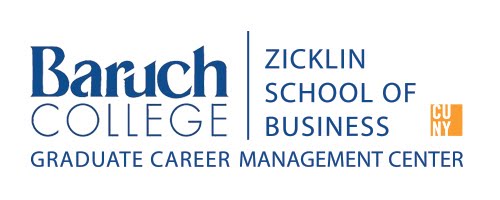By Dr. Lindsey Plewa, Deputy Director of the Graduate Career Management Center at Zicklin School of Business
The start of 2024 brought layoffs from companies across all industries including Nike, Ford, Microsoft, and Deutsche Bank, among many others (Intellizence). Layoff announcements this past February hit the highest for the month since 2009 (CNBC).
If you haven’t been personally affected by a layoff, chances are you know someone who has. Getting laid off can be overwhelming and scary. If you’ve been laid off, here are 4 ways to take control of your career.
1. Get Your Ducks in a Row
Talk to your employer to understand severance pay. For example, is your severance pay a lump sum or a continuation of your salary over a period of time? In addition you’ll want to understand health insurance coverage and if it ends on your last day, now may be a good time to book any needed doctors appointments. Note: federal law requires employers with 100 or more workers to give 60 days’ notice of a layoff affecting 50 or more employees. (US DOL) Once you’ve reviewed the details with your employer, file for unemployment. Filing differs from state to state but in general, if you lost a job due to no fault of your own, you would likely qualify.
2. Pause
Now that you’ve talked to your employer to understand your financial situation, maybe you’re not ready for action. Maybe you’ve been feeling stuck for a while and desperately need a change. Maybe this is the push you needed.
If that’s the case, don’t silence that inner knowing. Whether it’s totally changing career paths, starting a business, completely focusing on that side hustle, or going back to school, share your idea with a trusted friend, mentor or a career coach. YOU are the driver of your career and only you know if it’s time to change direction.
3. Reflect
While it may be tempting to hurl yourself into a job search, it’s important to first recognize that a layoff happens because of a company’s need to restructure, not because of an employee’s performance.
If you are in a negative headspace, that will reflect in your job search efforts. Take stock in all you have to offer a future employer by:
- reviewing your past performance reviews noting areas where you excelled
- taking an assessment like the CliftonStrengths and working with a Career Coach to understand your unique skill set (especially important for career changers)
- asking colleagues to write you a LinkedIn recommendation
4. Get the Word Out
Did you know that 9 out of 10 employers use LinkedIn during the hiring process? Check out this LinkedIn job seeker checklist to make sure you are taking advantage of all the sections of your LinkedIn profile.
Once you do that, get the word out about your situation. You can utilize the “open to work” feature, but a more proactive way to use LinkedIn is to post a message about your background and the type of people you’re looking to connect to. For example:
Hey LinkedIn community!
I was recently affected by the layoffs at (company) and I’m looking to connect to folks in the (x space/industry). I have experience in (x,y,z skills) so if you know of anyone in this field, please direct message me or tag them here so I can reach out for a conversation.
Thank you!
Finally, keep in mind that layoffs are unfortunately very common and there have been many just like you who went through something similar. The layoff is not a reflection of the work you’ve done or the work you still have to offer. Keep your head up and take small steps each day. As the poet, Rumi, says, “As you start to walk on the way, the way appears.”
For over a decade, Dr. Lindsey Plewa has coached thousands of clients on how to successfully navigate a job search. She is currently the Deputy Director of Career Advising at the Zicklin School of Business at Baruch College in New York City. She holds an MA from New York University and an EdD from Northeastern University.

